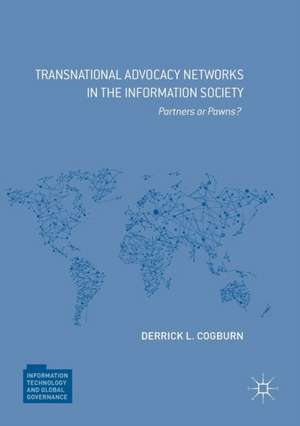Transnational Advocacy Networks in the Information Society: Partners or Pawns?: Information Technology and Global Governance
Autor Derrick L. Cogburnen Limba Engleză Paperback – 6 mar 2019
Preț: 218.04 lei
Nou
Puncte Express: 327
Preț estimativ în valută:
41.72€ • 45.46$ • 35.16£
41.72€ • 45.46$ • 35.16£
Carte tipărită la comandă
Livrare economică 23 aprilie-07 mai
Preluare comenzi: 021 569.72.76
Specificații
ISBN-13: 9781349696871
ISBN-10: 1349696870
Pagini: 337
Ilustrații: XXXI, 337 p. 30 illus., 12 illus. in color.
Dimensiuni: 148 x 210 mm
Greutate: 0.45 kg
Ediția:1st ed. 2017
Editura: Palgrave Macmillan US
Colecția Palgrave Macmillan
Seria Information Technology and Global Governance
Locul publicării:New York, United States
ISBN-10: 1349696870
Pagini: 337
Ilustrații: XXXI, 337 p. 30 illus., 12 illus. in color.
Dimensiuni: 148 x 210 mm
Greutate: 0.45 kg
Ediția:1st ed. 2017
Editura: Palgrave Macmillan US
Colecția Palgrave Macmillan
Seria Information Technology and Global Governance
Locul publicării:New York, United States
Cuprins
Multistakeholderism and Contestation in Global Governance of the Information Society .- Contending Perspectives on Multistakeholder Global Governance: Theory, Conceptual Framework, Data, and Methods .- From NWICO to Global eCommerce: Telecommunications Restructuring and the GII .- ISOC, ICANN and Experiments in Multistakeholder Global Internet Governance .- World Summit on the Information Society (WSIS): Catalyst for Transnational Advocacy .- Global Alliance for ICT and Development (GAID): What Went Right, and Wrong .- Internet Governance Forum (IGF): What Went Right .- The Civil Society Internet Governance Caucus (IGC) as Transnational Advocacy Network .- Relinquishing the Root: Snowden, NETmundial, and the IANA Transition .- Towards a Model of Transnational Advocacy Networks as Multistakeholder Global Governance: Conclusions and Future Research.
Notă biografică
Derrick L. Cogburn is Professor of International Communication and International Development in the School of International Service and Professor of Information Technology & Analytics in the Kogod School of Business at American University. He is founding Executive Director of the Institute on Disability and Public Policy (IDPP) and COTELCO: The Collaboration Laboratory, and is Co-Director of the Internet Governance Lab. He is past president of the Information Technology & Politics Section of the American Political Science Association (APSA) and of the International Communication of the International Studies Association (ISA).
Textul de pe ultima copertă
This book examines the role of transnational advocacy networks in enabling effective participation for individual citizens in the deliberative processes of global governance. Contextualized around the international conference setting of the United Nations-sponsored World Summit on the Information Society (WSIS) in 2003 and 2005, the book sees epistemic communities and information and communication technologies (ICTs) as critical to the effectiveness of this important organizational form. Historically, governments have dominated the official “conference diplomacy” surrounding these World Summits. However, reflecting the UN General Assembly resolution authorizing WSIS, transnational civil society and private sector organizations were invited to participate as official partners in a multistakeholder dialogue at the summit alongside the more traditional governments and international organizations. This book asks: are transnational advocacy networks active in the global information societyinfluential partners in these global governance processes, or merely symbolic tokens—or pawns? Cogburn explores the factors that enabled some networks—such as the Internet Governance Caucus—to persist and thrive, while others failed, and sees linkages with epistemic communities—such as the Global Internet Governance Academic Network—and ICTs as critical to network effectiveness.
Caracteristici
Illustrates the fundamental changes of the information society, and how they necessitate the involvement of civil society and other non-state actors in global governance practices Combines substantial qualitative and quantitative data into comparative case studies of international global governance conferences and policy procedures Argues for continued importance and resilience of international regime theory as a conceptual framework in the information society













